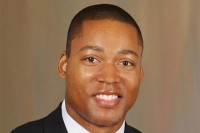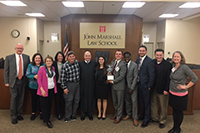The John Marshall Law Review is hosting a day—long symposium on April 24, 2009. “Organizing and Law in the Obama Era” bringing together academics, organizers and attorneys to examine the interplay between the law and lawyering and the grass roots perspective of organizing.
The program focuses on the challenges of organizing for social change and the role of the legal profession, and the dichotomy between organizers and cause lawyers. The law provides the framework in which organizers operate. It both limits and empowers those seeking social change.
“We‘ve selected this symposium topic because it is so timely. This year marks the 100th anniversary of the birth of Saul Alinsky, a legendary Chicago native, who made a national reputation by organizing citizens. This anniversary coincides with the historic election of Barack Obama who started his career as a community organizer,” said Will Weltman, Editor-in-Chief of the Law Review. “Our panelists come from varied backgrounds. We are expecting a lively discussion.”
Guest presenters will include
- Professor Barbara Bezdek of the University of Maryland School of Law
- Professor Scott Cummings, Chair of the Epstein Program in Public Interest and Law and Policy at the UCLA School of Law;
- Professor Peter Dreier, Dr. E.P. Clapp Distinguished Professor of Politics and Director of the Urban and Environmental Policy Program at Occidential College
- Dr. Marshall Ganz, Lecturer in Public Policy, Hauser Center for Nonprofit Organizations, Kennedy School of Government at Harvard University
- Greg Galluzzo, Executive Director of the Gamaliel Foundation
- Robert T. Gannett, Executive Director of the Institute for Community Empowerment
- Gabe Gonzalez, Director of Campaign for Community Values at the Center for Community Change
- Sanford Horwitt, Alinsky biographer
- Jackie Kendall, Executive Director of the Midwest Academy
- Howard Learner, President of Environmental Law & Policy Center
- William McNary, President of USAction
- Associate Professor Laura Beth Nielsen of Northwestern University
- Professor Bill Quigley, the Janet and Mary Riley Distinguished Professor of Law and Director of the Law Clinic and Gillis Long Poverty Law Center at Loyola University—New Orleans School of Law
- Associate Professor Gerald Rosenberg of the University of Chicago Law School
- Professors Michael Seng and Steven Schwinn of The John Marshall Law School
- Assistant Professor Corey Shdaimah, Coordinator for the MSW/JD Dual Program at the University of Maryland
- Barry Taylor, Advocacy Director for Equip for Equality; and
- Gerald Taylor, National Staff Member with the Industrial Areas Foundation.
Saul Alinsky, who would have been 100 years old this year, left an indelible mark in Chicago and communities across the United States through his organizing efforts. Considered the father of modern community organizing, Alinsky‘s first organizing effort was in Chicago‘s Back of the Yards neighborhood. While organizing in Chicago‘s Woodlawn neighborhood, Alinsky founded the Industrial Areas Foundation to train organizers and assist in the organizing of communities across the country.
He believed that organizing community members gave the simple masses the power they needed to accomplish their own objectives and not those forced upon them.
President Barack Obama‘s work as a community organizer became an issue in the 2008 presidential campaign. Obama was a community organizer in the 1980s after graduating from Columbia University. He worked to organize residents of the far south side, especially around Altgeld Gardens, who felt the City of Chicago was not fulfilling its obligations to the community that was facing major environmental issues and economic hardship.


